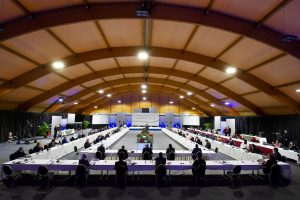By Sami Zaptia.

London, 4 February 2021:
Three NGOs representing Greater Tripoli (the Tripolitanian Society, the Tripoli Elders and Wise Council and Sug Juma Elders and Wise Council) today rejected any controversial figures being appointed to high office by the UNSMIL-brokered Libyan Political Dialogue Forum (LPDF) process currently meeting in Geneva.
War criminal saleh?
The NGOs specifically announced their rejection of House of Representatives (HoR) head, Ageela Saleh, who they called the legaliser of the killing of Libyans. They insisted on his trial as a ‘‘war criminal’’ decreeing the decision for the military attack on Tripoli at the very time when Libyans were about to meet for UNSMIL-brokered dialogue in Ghadames (April 2019). He should be put on trial for crimes against civilians in all parts of Tripoli, they insisted.
Saleh has regional support at LPDF
It will be recalled that Saleh had received a high number of votes (9 votes – 39.1%) in the first round of individual voting in Geneva this week, but not enough to take him through as he did not gain votes over the prescribed 70 percent threshold.
List system enables unpalatable figures?
The process has now moved on to the list system where political horse trading is taking place. This will ensure, due to its build-in regional bias, that unpalatable figures to one or two regions will get through as part of realpolitik deals. Saleh is favourite to get through on such a list system. Equally, by being head of the HoR he holds a strategic position in getting the planned referendum on the draft constitution and the 24 December 2021 elections through parliament.
Declaration of civil war?
The Tripoli NGOs warned that any procedure that hands Saleh power would be tantamount to a declaration of civil war that will not end until Libya is divided. It will also lead to the killing of its citizens and tearing apart of its families.
LPDF and UNSMIL held responsible
To this end, the NGOs called on UNSMIL to keep controversial figures who caused the breakup of its social fabric, and participated in many crimes against the Libyan people and against human rights away from the process in order to guide Libya to safe shores.
They, therefore, placed responsibility for all what may follow on the LPDF and UNSMIL for putting such controversial figures on top of the country’s authority pyramid.







